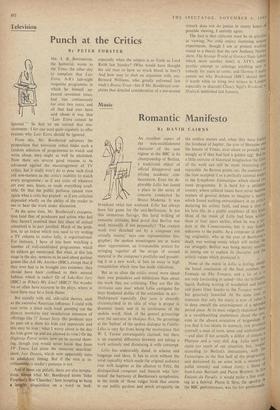T elevision
Punch at the Critics
By PETER FORSTER Ma. J. B. BOOTHROYD, the humorist, wrote to the Times the other day to complain that Late Extra, A-R's late-night magazine programme in which he himself ap- peared seventeen times, had 'run continuously for over two years, and all that had ever been said about. it was that "Late Extra cannot be ignored." ' So first let me correct that mis- statement: I for one used quite regularly to offer reasons why Late Extra should be ignored.
From this, Mr. Boothroyd advances the proposition that television critics make such a random selection of programmes to watch and write about, they might as well be abolished. Now there arc several good reasons to be advanced against the encouragement of TV critics, but it really won't do to pose such tired old non-starters as the critic's inability to watch every programme: as if any critic of whatever art ever sees, hears, or reads everything avail- able. Or that the public perforce cannot view again what a critic has praised: as if any criticism depended wholly on the ability of the reader to see or hear the work under discussion.
At the same time, Mr. Boothroyd's exaspera- tion (and that of producers and artists who feel they haven't received their fair share of critical, attention) is in part justified. Much of the prob- lem, to an extent which you need to try writing a TV column to realise fully, is organisational. For instance, I have of late been watching a number of well-established programmes which do seldom get mentioned. But what, at this late stage in the day, remains to be said about parlour games like Ask Me Another (BBC), except that if they ever had to be brought into existence, they should have been confined to their natural habitat, which is radio? Or of Juke-Box Jury (BBC) or What's My Line? (BBC)? No wonder we so often have recourse to the plays, where at least there may be a fresh theme.
But equally with old, still-valid themes, such as the excessive American influence. I could with ease write a piece each week pointing out the phoney mentality and mendacious nonsense of offerings like 77 Sunset Strip. (Its producer says he puts on a show his kids can appreciate and this may be true: what I worry about is the day his kids grow up and are allowed to vote.) Or the Highway Patrol series, now on its second show- ing, though you would never know that from TV Times. Let alone the nauseous near-kids' show, Just Dennis, which now apparently rates an adultAhour timing. But if the vein ,is in- exhaustible, a reader's patience is not.
And if those are pitfalls, there are also tempta- tions. Given what Mr. Boothroyd terms 'John Freeman's Star Chamber,' how tempting to hang a lengthy disquisition on a word or look, especially when the subject is, as frank as Lord Reith last Sunday? (Who would have thought the old man to have so much blood in him?) And how easy to start an argument with, say, Bernard Williams, who greatly enlivened last week's Brains Trust—but if Mr. Boothroyd com- plains that detailed consideration of a ten-second remark does not do justice to ninety hours possible viewing, I entirely agree.
The fact is that criticism must be as selective as viewing. No critic enjoys slamming sincere experiments, though I am at present workalti round to a theory that the new Anthony NewleY show, The Strange World of Gurney Slade (about which more another time), is ATV's subtle• pyrrhic attempt to sabotage anything new in comedy for years to come; and likewise I really cannot sec why Bookstand (BBC) should think it worth while to bring two miners to London' especially to discredit Clancy Sigal's Weekend Dinlock. published last January.














































 Previous page
Previous page